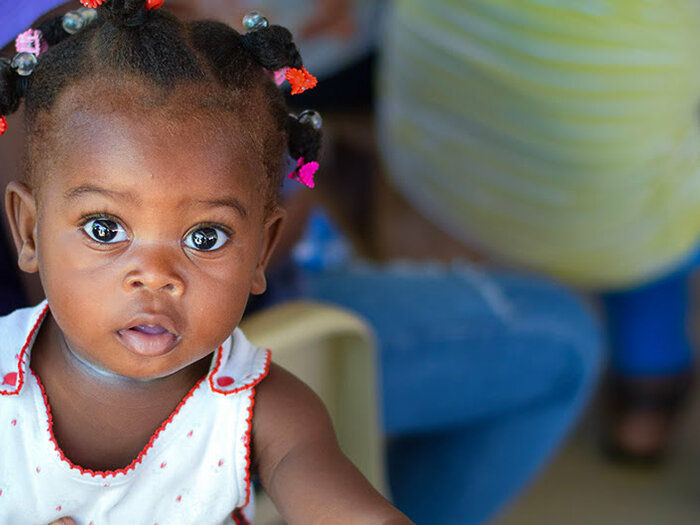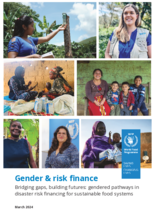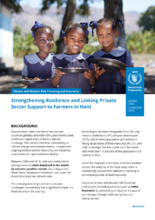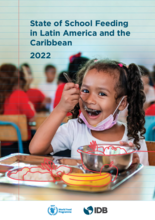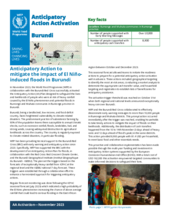Haiti
- 4.35 million
- people suffer from acute hunger, almost half the population of 11.7 million
- 1.4 million
- people face emergency levels of hunger and require urgent assistance to survive
- 420,000
- schoolchildren receive daily meals with support from WFP
Haiti is the poorest country in the Latin America and the Caribbean region and among the poorest in the world. Hunger is tightening its grip as insecurity, violence and deepening economic woes combine with climate-related shocks and other disasters.
Haiti has one of the highest levels of food insecurity in the world. The number of food-insecure people has tripled since 2016. A total 4.35 million Haitians - nearly half the population - do not have enough to eat and 1.4 million are facing emergency levels of food insecurity.
In the Cite Soleil neighbourhood of Port-au-Prince, catastrophic levels of hunger have reduced thanks to emergency response by WFP and partners. However, any disruption to humanitarian support could result in deepening hunger. Global acute malnutrition affects 7.2 percent of children aged under 5, while 66 percent of under 5s suffer from anaemia.
Poor performance of agriculture and heavy dependence on imports also drive food insecurity. This makes the country vulnerable to inflation and price volatility in international markets. Consumer prices for major food products are 30 to 77 percent higher than in the Latin America and Caribbean region.
These issues have been exacerbated by a series of disasters over the past two decades, including storms, flooding, landslides, drought and earthquakes. On the 2021 Climate Risk Index, Haiti is third among the countries most affected by extreme weather events from 2000 to 2019.
The World Food Programme (WFP) has been in Haiti since 1969. We work with the Government to build sustainable systems to address the root causes of food insecurity and promote resilience. We also support the Government and partners during emergencies.
What the World Food Programme is doing in Haiti
-
School meals
-
WFP supports the Ministry of Education in broadening and improving school meals in Haiti. WFP’s Home-Grown School Meals Programme has been expanded to further support the local economy and smallholder farmers, with over 50 percent of children eating meals made from locally bought food. A total 210,000 schoolchildren received daily Haitian-grown school meals in 2023.
-
Support to local agriculture and markets
-
WFP works with over 150 OPAs (Organisations de Producteurs Agricoles) to source food from smallholder farmers. WFP injects on average US$1 million into the local economy each month, through buying Haitian-grown products. In partnership with the Ministry of Agriculture, WFP also provides capacity building to the OPAs, including technical training on storage and grain conservation, quality control and reduction of post-harvest losses. In addition, WFP subsidizes the set-up of processing facilities and assists with providing equipment.
-
Resilience building
-
Resilience activities address immediate food needs through cash transfers, while promoting the rehabilitation of assets that improve food security by mitigating, adapting to and recovering from seasonal shocks. WFP invests in disaster risk reduction, while reinforcing local agriculture, through watershed management, soil and water conservation and canal rehabilitation activities, micro-insurance coverage and provision of agricultural inputs, livestock and technical assistance. WFP’s resilience projects also enable access to basic social services and stimulate markets through rural road rehabilitation and installation of portable water points.
-
Capacity strengthening
-
WFP supports the Government in the expansion and institutionalization of Haiti’s social registry, a national vulnerability database. WFP also supported an Operational Manual on shock-based social protection, based on data from the social registry and electronic transfers.
-
Emergency preparedness
-
WFP works to ensure that stocks of emergency food are on standby in strategic locations prior to the start of the hurricane season, which runs from June to November each year. Emergency stocks pre-positioned by WFP have enabled a swift response to every crisis for the past decade, in coordination with the Directorate of Civil Protection.
-
Nutrition
-
WFP screens children for malnutrition at the community level, in collaboration with the Ministry of Health, referring those in need of treatment to health centres, while also providing specialized nutritious food. WFP also offers nutrition education, through classes and counselling, to people living with HIV. Fifty schools were involved in a pilot programme to promote gender and nutrition among 3,000 students, over 4,000 parents and 12,000 community members, including through workshops and radio shows.
Haiti news releases
Go to pagePartners and donors
Find out more about the state of food security in Haiti
Visit the food security analysis pageContacts
Office
Programme Alimentaire Mondial, Juvenat 7, Pétion-Ville
Port-au-Prince
Haiti

